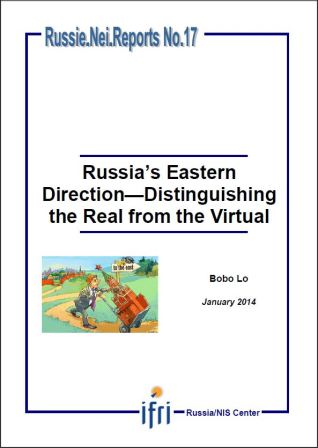Russia's Eastern Direction - Distinguishing the Real from the Virtual

The Asia-Pacific region has assumed primary importance as a center of global politics and economic dynamism. For Moscow, this development highlights a world in which many long-standing assumptions about international politics are being overturned. It speaks of “global power … shifting to the East,” and of Russia becoming involved in the “dynamic integration processes in the ‘new Asia".” But for all the rhetoric about a “turn to the East”, Russia’s commitment to serious engagement with the Asia-Pacific is uncertain. Its elite retains a strongly Western-centric world-view, even as it criticizes Western shortcomings.
Although Moscow has begun to appreciate Asia as important in and of itself, it is mainly concerned to assert Russia as an “independent” Eurasian center of power within the “polycentric system of international relations”. Cooperation with Asian countries is the means to a larger end rather than the end itself. The outcome of these contradictions is predictably mixed. On the one hand, Moscow is investing greater effort into the Asia-Pacific—a focus heightened by the critical importance of the “strategic partnership” with China, the vulnerability of the Russian Far East, and the need to diversify energy exports. On the other hand, Russia remains a peripheral actor in the region—a country that may be in Asia, but is far from being of Asia. The Kremlin’s tendency to see international relations primarily in terms of Great Power relations means, in particular, that it does not have an Asia policy so much as a policy toward the major Asian powers, above all China. Over the next decade, Putin will continue to prioritize the relationship with Beijing, and Russia’s China-dependence will increase despite efforts to diversify ties with Japan, Vietnam, and India. Economic engagement will be dominated by energy exports, although Russia will be a niche rather than primary supplier of Asian requirements. More generally, the Asia-Pacific will remain a secondary “vector” for Moscow, and the vision of Russia as a “Euro-Pacific power” aspirational at best.

Available in:
Regions and themes
ISBN / ISSN
Share
Download the full analysis
This page contains only a summary of our work. If you would like to have access to all the information from our research on the subject, you can download the full version in PDF format.
Russia's Eastern Direction - Distinguishing the Real from the Virtual
Related centers and programs
Discover our other research centers and programsFind out more
Discover all our analysesDeathonomics: The Social, Political, and Economic Costs of War in Russia
The report attempts to outline and examine a truly new phenomenon in Russian society, dubbed “deathonomics”—the making of a mercenary army against the backdrop of the Kremlin’s war in Ukraine, eventually replacing both the Soviet (conscript) and early new Russian (contract) armies. It notes that, by the end of 2023, this trend had turned the military service into one of the highest-paying professions in the country, something not seen in Russia on such a scale since the late 17th century.
Russia's Asia Strategy: Bolstering the Eagle's Eastern Wing
Among Russia’s strategic priorities, Asia traditionally played a secondary role compared to the West. In the mid-1990s, then Foreign Minister Yevgeny Primakov initiated a rapprochement with China and India. Then, in 2014, deteriorating relations between Russia and the West prompted Moscow to begin its “great pivot to the East”.
Kazakhstan After the Double Shock of 2022: Political, Economic and Military Consequences
The year 2022 represented a dual shock for Kazakhstan. In January, the country faced its most severe political crisis since independence, followed in February by Russia’s full-scale invasion of Ukraine, which cast uncertainty over the borders of post-Soviet states. These consecutive crises profoundly shaped Kazakhstan’s domestic and foreign policy.

How the Russian Army Changed its Concept of War, 1993-2022
The traditional and high-intensity war that has occurred in Ukraine since Russia decided to invade raises a key issue: did post-soviet Russian strategic thought really prepare Russia for waging this war?










